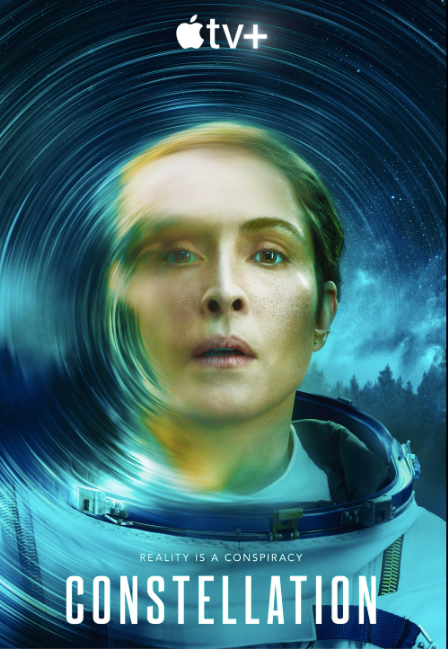
I've read and seen many alternate reality stories. Some are caused by quantum entanglement -- the mega version of two subatomic particles colliding and then moving in opposite directions but still intimately and instantly connected -- and some just happen or are already there. I just reviewed a movie with that schema, and have written a few double realities stories and a novel with that premise myself. But none explore the existence and impact of that on families the way that Constellation does. Indeed, none do much of that at all in the at once deep and startling way that this new series on Apple TV+ does.
[Some spoilers ahead ... ]
The title and the start of the series makes you think it's a story about space travel. But space is just the catalyst for a powerful, heart-tugging story that takes place right here on Earth. Jo is an astronaut on the International Space Station, which suffers a devastating accident. Most of the astronauts, cosmonauts, and space travelers from Europe manage to return to Earth. Jo and Paul are left on station. Paul dies of his injuries. Jo manages to get back to Earth, and that's when the fun begins. That is, fun for us, quite the opposite for Jo and her family.
Jo soon discovers that things aren't quite the same with her family as when she left for the voyage to the ISS. Her husband Magnus is surprised with how much Jo seems to like him. Her daughter Alice doesn't seem quite the same person. We soon learn that this voyage to space has split Jo's reality into two -- literally. There are, or were, two Jo's, two Magnus's, two Alice's. We hear about macro quantum entanglements. In this case, two families, which in fact are two versions of the same family. And things get really crazy when they try to communicate with one another.
There's a history to this -- the strange effect of going out into near space has been happening at least since the 1970s. There's a touch of alternate history, too. There's an Apollo 18 mission (in our reality, the Apollo Program ended with Apollo 17's trip to the moon). But the heart of this carefully crafted narrative is the agony that Jo's two families -- the same family, in two slightly but significantly different versions -- go through as they struggle to make sense of Jo's return from space and what's happening to them.
The narrative is immensely savvy, with winks to all kinds of things. There's a cat that lives and a cat that dies -- the same cat, actually, in alternate realities -- apropos Erwin Schrödinger. Alice lives up to her literary tradition, in wonderland on both sides of the looking glass. And the story is lifted by powerful performances, especially Rosie and Davina Coleman (twins) as the Alices, and Noomi Rapace as Jo. Jonathan Banks as Henry/"Bud" Caldera, an astronaut on that Apollo 18 mission and still very much around in twofold form in the 2020s, puts in an even more memorable than usual crusty performance. And it was good to see Barbara Sukowa as Irena, a cosmonaut whose double plays a crucial role in this story. Hats off twice to Peter Arness (Wallander) who created and wrote the series.
All in all, a thought-provoking, tightly woven, emotionally valent eight episodes of what could well be the first season of more to come, and I won't soon forget in any case.


No comments:
Post a Comment